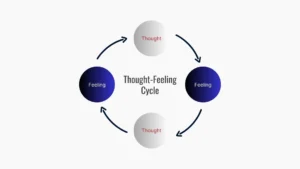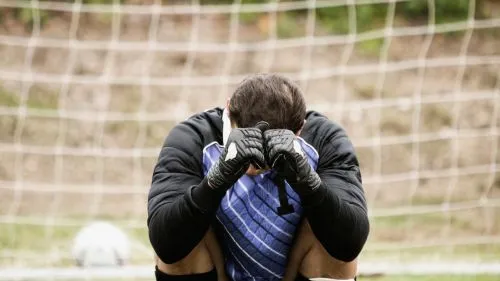“I always get down on myself after a bad game.”
That’s what a college athlete told me in a mental performance coaching session the other day.
He went on to say, “…I can’t stop beating myself up and I just keep going over and over my mistakes.”
Sound familiar?
Getting down on yourself is easy.
But it’s also hurtful.
Which is why, if you do beat yourself up after mistakes, you need a strategy you can use to stop getting so down on yourself after games.
#1 Reason Athletes Get Down on Themselves After Games
Do you like making mistakes?
That’s a pretty odd question, don’t you think? No athlete I’ve ever talked to expressively likes mistakes.
They may have a healthy perspective of mistakes and see mistakes as a way to learn…but they sure as hell don’t get all happy and excited when they make them.
Mistakes are the opposite of what you strive for. They are roadblocks on your way to a successful game.
Necessary roadblocks, but roadblocks nonetheless.
Since mistakes are the opposite of what you strive for in a game, they also become indicators that you didn’t play as well as you’d have liked.
Very magnetic indicators, at that.
They draw your attention to them like a magnet.
After games, it’s natural to focus mainly on mistakes. But once you begin to notice one mistake, they’ve got you. Now you notice two, three, four things you did wrong.
All of a sudden you’ve spiraled and are feeling down on yourself.
So what’s the number one cause of feeling down after games?
Focusing too much on mistakes.
Don’t I Need to Examine Mistakes in Order to Improve?
Yes, you absolutely need to look at mistakes in order to improve. You won’t make much progress if you continue to overlook the aspects of your game you aren’t doing well.
However, there’s a difference between focusing too much on mistakes to where you get down on yourself and looking at mistakes as a way to learn.
With the former, mistakes are in control. With the latter, you are in control.
When you get down on yourself, you aren’t in a good position to learn. You are feeling upset over the way you played, and your thoughts mirror that feeling.
Going back to the college athlete I mentioned in the introduction, he explained to me that after games he would replay mistakes in his mind. Over and over again he kept seeing them.
Now, this wasn’t a productive activity for him. He wasn’t going over his mistakes like a coach reviewing film.
The mistakes kept replaying as a way to affirm how badly he felt about himself and how embarrassed he was about his performance.
Our minds may try to rationalize focusing on mistakes post game as a way to learn. But ask yourself, are you really learning anything?
And if you are, is what you learn outweighed by the frustration and embarrassment you feel?
Your Thoughts and Feeling Down After Games
There is something known as the thought-feeling cycle that helps explain the impact your thinking has on feeling down after games.
The thought-feeling cycle illustrates how a thought leads to a feeling, which leads to another thought, resulting in another feeling.
Here is a diagram that shows the thought-feeling cycle:

Let’s say you have a thought like, “I played terribly today.”
What feeling results from that thought?
A feeling of satisfaction and happiness with your performance? Or a feeling of frustration and disappointment?
Naturally, if you think, “I played terribly today,” you will feel down.
That shows the power your thoughts have over your emotions.
The cycle continues, because since you already feel down, you’ll likely look for other mistakes you made, further criticize yourself, and feel even worse.
It’s a negative spiral that can result in days of frustration and a significant drop in confidence.
On the other hand, there’s a positive version of the thought-feeling cycle. One where you have better thoughts, leading to better feelings, resulting in a continuation of better thoughts.
The cycle itself is neither negative nor positive. It simply responds to your thoughts and feelings and takes the descriptor of positive or negative based on the types of thoughts you have.
Which means, if you want to stop feeling down after games, we need to change your thinking.
Strategy to Stop Getting Down on Yourself After Games
When you get down on yourself after games, we know your thoughts are negative and you are focusing too much on mistakes.
That means, we need to alter your thinking and get you to stop tearing yourself apart over mistakes and learn how to look at them in a productive way and then let go and move on.
The strategy begins with an exercise to change your thinking, since that is the beginning of the cycle and can quickly set you down a negative path.
The second part is where we’ll go over a way you can learn from mistakes instead of beating yourself up.
Reframing Your Thinking After Games
Good game or bad game, it doesn’t matter. You can’t allow your mind to be controlled by negative thoughts.
But negative thoughts aren’t kind. They don’t care if you don’t want them there. They are uninvited guests that are a bear to get rid of.
But here’s the thing…we aren’t going to try to get rid of them.
Wait, I thought that’s exactly what we needed to do since the whole thought-feeling cycle is fueled by thinking? We can’t allow those negative thoughts to stick around!
Right. We can’t have the negative thoughts stick around. However, you also cannot force thoughts out of your mind.
Our thinking is all about attention.
When we focus on something, even if we are focusing on it in a way of pleading for it to be gone and to get rid of it, we are still focusing on it. Which means it will only stick around.
When you try to get rid of negative thoughts, you only give them more fuel. Your attention multiplies them.
Instead, we are changing our goal to having more positive thoughts. I know, it seems like the same thing, but it is completely different when it comes to your attention.
When your goal is to get rid of negative thoughts, you’re focusing on the negative thoughts and how much you want them to leave and how you need to get them out of your head.
But when your goal is to have more positive thoughts, now you’ve altered your attention. You’ve taken focus off your negative thoughts and are beginning to fuel more positive thoughts.
As positive thoughts increase, negative thoughts will fade away.
The exercise you can use to help with this is reframing.
Reframing involves noticing when you have a negative thought and then replacing it with a more positive thought.
Don’t get caught up in trying to get rid of the negative thought. Simply work on changing your attention and thinking something positive instead.
If you do this following games, you generate a different type of thought-feeling cycle instead of one that only causes you to feel down.
Changing How You See Mistakes After Games
Once you begin reframing your thinking, it’s time to weaken the magnetic pull of mistakes.
Remember, when you focus on mistakes after games, this causes you to feel down on yourself.
However, mistakes are also a necessary part of the improvement process. And can be used to help you grow as an athlete, if you use them in a proper way.
Having them lead to you feeling down on yourself after games shows that a change needs to be made in the way you see mistakes.
We want to turn mistakes from something you fear and a reason you weren’t good enough into something more positive.
and the way that’s done is by training yourself to see mistakes as a way to learn.
This simple mindset shift will have a profound effect on your mental game.
If mistakes are truly ways to learn and improve, there’s no need to get down on yourself after games. Instead, you view them as holders of information. Information you need in order to reach your goals.
But this information is clouded when you get down on yourself. Therefore, you need an actionable process you go through that keeps you from getting too upset over mistakes and keeps your thinking clear.
Clear to learn.
What you can do is write out all the mistakes you made during the game and then, either next to them or on another piece of paper, explain how you can learn from that mistake, and how you will work on it during practice or the next game.
Yes, this exercise takes effort. But it is effective. Instead of keeping mistakes bottled up in your head, you put them on paper, taking a more objective view. This provides you the opportunity to think through them clearly.
At first you may find this exercise difficult. Not just because of the time required for it to be performed, but also the fact that you’re having to come face to face with your mistakes.
Be patient with yourself and just stick with it.
As you go through this exercise, you will be gaining valuable information from every mistake you make.
But you will also be training a new way of seeing mistakes. A way in which mistakes are used to learn, instead of being a reason for you to get down on yourself after games.
Final Thoughts
If you’ve found yourself asking, “How can I stop getting so down on myself after games?” then it’s time to take the next step. And the next step is learning how to change your thinking, along with the way you see mistakes.
When you get down on yourself after games, it is your thinking that is the cause. If you can reframe your thinking, you change the way you feel.
In addition, you must reduce the magnetic pull of mistakes. This is accomplished through a change in perspective. You must turn mistakes into ways to learn, instead of reasons to get down on yourself.
Apply the two parts of the strategy outlined above, and you’ll be on your way to stop getting down on yourself after games.
Thank you for reading and I wish you the best of success in all that you do.





